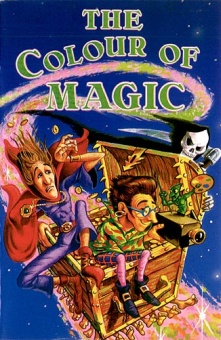| The Colour of Magic | |
|---|---|
 Original cover art | |
| Developer | Delta 4 |
| Publisher | Piranha Software |
| Series | Discworld |
| Platforms | ZX Spectrum, Amstrad CPC, Commodore 64 |
| Release | 1986 |
| Genre | Interactive fiction |
| Mode | Single-player |
The Colour of Magic is a text adventure game developed by Delta 4 and published by Piranha Software, released in 1986. It was released for the ZX Spectrum, Amstrad CPC, and Commodore 64 computers. It is the first Discworld computer game and so far the only one adapted directly from one of the novels, and follows the plot of the book closely.
Contents
In 2006, another video game based on The Colour of Magic was released on mobile phones titled Discworld: The Colour of Magic. [1] It is an isometric action game. [2]